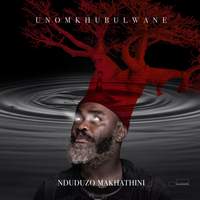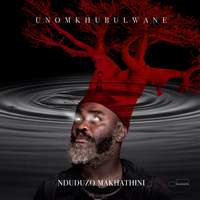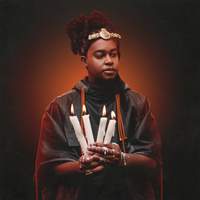Interview,
Nduduzo Makhathini on uNomkhubulwane

Last week saw the release of uNomkhubulwane, the latest release from South African pianist, philosopher and healer Nduduzo Makhathini. Divided into three movements, the recording acts as a holistic suite, bridging the ancient wisdom of the traditional Zulu religion with more recent postcolonial issues that speak to our own times. Reflecting a strong lineage of Black consciousness within his own country, the musician paid a recent visit to New York's (Le) Poisson Rouge, where he launched the new Blue Note album – his third for the label. Fortunately for us, we were lucky enough to receive a video call before the sold-out gig from the great man himself, who was out and about wandering the streets of Manhattan, only more than happy to answer a few questions...
Before we dive into your new album, I first wanted to mention your surreal but always fascinating artwork choices. This record seems like no exception to that habit!
Man, I think it's because of the underpinnings, which are always conceptual! With every album, there’s a question that I'm dealing with. Everything is trying to produce a question, you know? It's a very intentional thing from my side to think about how people will view what we're putting out. It’s a holistic kind of approach, based on conceptual thinking. [For In The Spirit of Ntu] I was thinking about what I would look like if I was set in a different time, so to speak. Ntu is really vital for us, it speaks to the ways in which there is code generated in humanity that has been evolving over time. It was like going back in time – a fictional way of thinking about going back.
I'm intrigued by your spoken work invocations, particularly on 'Omnyama' - the track that kicks off the new album. What was your intention behind setting off in this way?
I've been slowly checking out of this paradigm of being an author in everything that I'm doing, and more attributing it to a metaphysical dimension. In a sense then, I'm proposing that the greatest composition we could ever create as artists is that of self, which happens through a process of surrender. And so, in the beginning, I'm dealing with what I call ‘prophetic text’, which is basically trying to produce a genealogy of ancient gods, deities and ancestors, enticing them to speak and requesting guidance in this process, this music. I think [the opening movement] ‘Libations’ is really the way to invite a spiritual presence to the record.
Could you tell us the ways in which your native Zulu mythology and its symbolism underlay this recording?

The central figure is uNomkhubulwane. She is part of a mythical institution of the Zulu people, which tells us that, in the beginning, people broke off from the reed. Through this moment was how our humanity and all living things came about. In other words, we all have this collective essence, ntu, and in breaking it, uNomkhubulwane became the only daughter of the creator. She is a rain goddess, and governs creativity and fertility… uNomkhubulwane regulates balance. And so, if we think about her as a symbol that does all of these things, I transpose that and juxtapose it to Black biographies. We are troubled by brokenness, these various normative states of lack, the inability to be free and all of these things. What if we were to look at creation myths as a way to recharge these difficult times for humanity? In other words, I'm looking at what indigenous knowledge systems have to do with remedying the very troubled times of the present.
How have you worked to share this sacred wisdom through a conventional album structure?
I look into these three movements: On the one hand, you have the movement of enticing the gods by way of libation, but then you have this movement of water... uNomkhubulwane is often associated with the energy of creation, like thinking about the womb, but also the fact that she regulates the moon and the ocean. I've been juxtaposing this as a way of looking at the troubles of the Atlantic and its displacement. Looking at 'Water Spirits', I also started to think about the seasons. According to the African calendar, when the sun departs from the southern hemisphere to the North, this is associated with the lament of uNomkhubulwane; she's not creative but kind of... hibernating! In thinking about all of these things, looking at ways in which materials could be utilised to think about the everyday and how these primordial texts allow us to think about interventions in these very difficult moments for humanity, the freedom aspect of it – ‘the ability for grace to come’ – is translated to ‘Inner Attainment’. When all of the catastrophes to have hit Black biographies and their traumas are healed, then we'll have the ability to reach the transcendence where we are shifted beyond these troubled bodies.
There seems to be a historic link of spiritual emancipation from political struggles through music, especially within the context of jazz...

Yeah, man. I think if you look at the US in the sixties, there was already a huge insurgence of people really contemplating spirituality as an intervention to the backdrop of Jim Crow and the Civil Rights movement. This is when a lot of people had devotional names, they were either consulting Islam or looking at Africa and thinking about what has now become 'Afrofuturism' – the production of a utopian place as an alternative for the otherwise very difficult times they were facing. In South Africa, there are those connections, too. The sixties were a time of Black consciousness, signified of course by [Steve] Biko’s movement. People were also dealing with a different kind of setup then, with physical brutalisation. I mean, in 1960, there was the Sharpeville Massacre, pushing Black subjects out of the cities to utter dysfunctionality, and people were fighting against that. This is when the Blue Notes and all of those guys came out... These are people who were ducking bullets in South Africa; police brutality was quite the thing. Their robustness is something the author Lewis Nkosi speaks about... Those guys were seeking freedom, and music was the only way to push against Western systems in order to disrupt them – by way of avant-garde and free music.
I wonder how that notion might relate to the current sociopolitical situation in South Africa?
I mean, a lot is going on with our country. It's important to note that it's the newest democracy we have in the continent. In other words, we're the last ones to receive independence! South Africa was colonised twice by the British and the Dutch, so we're currently dealing with a lot of echoes of apartheid. I mean, racism is still very explicit in South African society; inequality, the gap between the poor and the rich, black and white… This is a time where we're thinking that the promises that came with the 1994 elections – to provide basic needs for black people in South Africa, education, healthcare and housing – are still not resolved. Thirty years after people have been voting for the ANC, they're realising, well, these promises are still not dealt with, so there's this confusion which is currently happening now. But also, we realise it's still part of the bigger problem of capitalism. These kinds of economic problems in South Africa are systematic – it's a theatre that is produced. There's no one way to read South African politics, the problem being that nothing of post-apartheid democracy is implemented in a concrete way! We live in a period where apartheid still shows its ugly face in many ways.
The world of politics isn't one you tackle head-on through your work, though. Is music more than just a means to an end for you in achieving reparative goals?

I wouldn't really know, to be quite honest, but I think the major intervention here is that of creating an alternative way to think about being in the world. I think that's the kind of freedom we need, so that's why I'm not wanting to speak about this in the context of politics or as a response to political matters. If anything, it's a way of thinking about restoration and bringing back things that are birthright to human beings. When we bring in politics, it suggests that freedom lies in another person's hands, but I think it lies in the spirit of the collective. If we're to think in terms of the music succeeding then, of course, it's by way of an ensemble to start with – just bringing three-or-four people to the bandstand who have a collective kind of pursuit. You can transpose that into a concert hall, whether it's temporary, but the music allows us to have a moment where we can live in another world, which in my work I call an ‘elsewhere’. How do we produce this other place? This is what Sun Ra and all of these guys were doing. This is the intervention, and I think to juxtapose it within politics limits what it can do, you know, as politics in themselves are very temporary and unstable for the most part... I'm trying to build another world, a deeper level of healing for Black biographies which politics won't be able to produce.
What do you make of the relationship between South African and Western musicians, particularly from America and the UK?
Oh, man... You know, this relationship is an old one! I mean, if you look at the sixties, that's a perfect example of what was happening via these moments of displacement, when people in America were dedicating a lot of their musical material to South Africa: Art Blakey, Max Roach’s We Insist! (1960) and all of these things… also thinking about how South African musicians arrived in London and created another aesthetic, a sensibility that came from their displacement or exile experience. And so to push forward, thinking about Shabaka and The Ancestors, the work I'm doing with Logan Richardson, Wynton [Marsalis] and all of the people in the US… There's a very strong transatlantic bridge informing the sound currently, and I think it's a very deep way to look at collective Black memories.
Finally, not only have you been serving an artistic role at Blue Note but an executive one as well! Tell us more about saxophonist Linda Sikhakhane, your first African signing?
One of the things I've been trying to set up following my signing to Blue Note was to expose what we could think of as the 'hidden years' of South African jazz that suffered the violence of apartheid and how, during it, a lot of archives were destroyed because they were deemed unimportant. That was an apartheid system to destroy a memory in South Africa. Part of what the conversation then started to become was setting up Blue Note Africa, a division that looks into making connections between those memories and the current articulations of South African jazz. Linda is one of the people who I've mentored over a period... I made this connection to Blue Note, and we hope to see more people getting licensed soon!
The new album from Nduduzo Makhathini, uNomkhubulwane, is available now. Linda Sikhakhane's iLadi will be released on Blue Note/Universal Music Africa on 12th July.
Available Formats: CD, MP3, FLAC, Hi-Res FLAC
Available Formats: MP3, FLAC, Hi-Res FLAC





